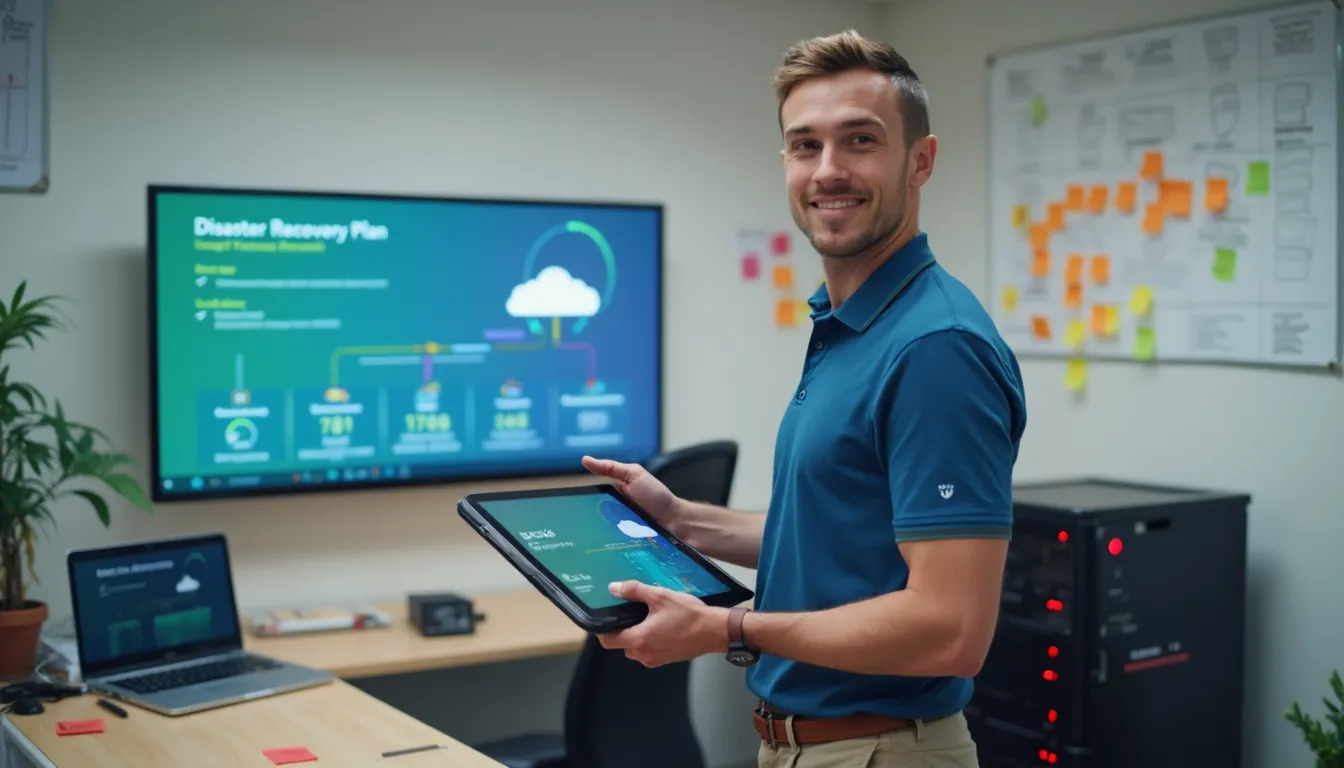Table of Contents
- Introduction
- The Changing Landscape of Work in Georgetown
- Essential Security Measures for Hybrid Work
- Employee Training and Awareness Programs
- Leveraging Technology for Hybrid Work Security
- Compliance and Regulatory Considerations
- Conclusion
Introduction
As hybrid work becomes the new normal for Georgetown businesses, strong cybersecurity is more important than ever. This article explores key hybrid work security strategies to protect your business in this changing work environment. Whether you’re in Georgetown, Milton, Burlington, or Oakville, these measures are crucial for keeping your digital assets safe.
The Changing Landscape of Work in Georgetown
The Rise of Hybrid Work Models
Hybrid work has changed how Georgetown businesses operate, mixing remote and in-office work. This flexibility brings new challenges, especially in keeping cybersecurity strong across different work settings.
Unique Challenges for Georgetown Businesses
Georgetown businesses face specific cybersecurity challenges when adapting to hybrid work:
- Securing old buildings with outdated tech
- Protecting employees working in public spaces
- Ensuring consistent security across various work locations
The Need for Robust Security Measures
Putting in place comprehensive hybrid work security measures is no longer optional. It’s necessary to protect your business from growing cyber threats in this new way of working.
Essential Security Measures for Hybrid Work
Implementing Strong Access Controls
Strong access controls are the foundation of hybrid work security:
- Multi-factor authentication (MFA)
- Role-based access control (RBAC)
- Regular updates to password policies
These measures ensure only authorized people can access sensitive data, no matter where they work.
Securing Remote Devices and Networks
Protecting remote devices and networks is crucial in a hybrid work environment:
- Use Mobile Device Management (MDM) solutions
- Set up Virtual Private Networks (VPNs) for secure connections
- Regularly update and patch all devices
Enhancing Data Encryption Protocols
Data encryption is vital for protecting sensitive information:
- Use end-to-end encryption for communication
- Encrypt data when it’s stored and when it’s being sent
- Set up secure ways to share files
Employee Training and Awareness Programs
Developing Comprehensive Security Policies
Create clear, enforceable security policies for hybrid work:
- Rules for using company devices
- Guidelines for handling sensitive data remotely
- Steps to take when there’s a security incident
Regular Security Awareness Training
Conduct ongoing cybersecurity training to keep employees informed:
- Practice spotting phishing attempts
- Teach best practices for remote work security
- Update on new cyber threats
Encouraging a Security-First Culture
Foster a culture where everyone cares about cybersecurity:
- Reward employees who find and report security risks
- Hold regular security briefings
- Include security in all business processes
Leveraging Technology for Hybrid Work Security
Cloud-Based Security Solutions
Use cloud security solutions to protect your hybrid workforce:
- Cloud Access Security Brokers (CASBs)
- Secure cloud storage and teamwork tools
- Cloud-based threat detection platforms
Endpoint Detection and Response (EDR) Systems
Implement EDR systems to watch and protect all devices:
- Detect and respond to threats in real-time
- Analyze behavior to spot unusual activities
- Automatically respond to incidents
Virtual Private Networks (VPNs) and Secure Gateways
Secure remote access through VPNs and secure gateways:
- Always-on VPN for company devices
- Zero Trust Network Access (ZTNA) solutions
- Secure web gateways to filter out harmful traffic
Compliance and Regulatory Considerations
Understanding Local and Federal Regulations
Stay informed about relevant cybersecurity rules:
- PIPEDA compliance for Canadian businesses
- Industry-specific rules (e.g., HIPAA for healthcare)
- Local data protection laws in Georgetown and nearby areas
Implementing Compliance Monitoring Tools
Use tools to ensure ongoing compliance:
- Automated compliance reporting systems
- Tools for classifying and managing data
- Regular compliance checks and assessments
Regular Security Audits and Assessments
Conduct periodic security evaluations:
- Check for vulnerabilities
- Test your defenses
- Have outside experts audit your security
Conclusion
Implementing strong hybrid work security measures is essential for Georgetown businesses in this new work landscape. By focusing on strong access controls, securing remote devices, improving data encryption, and creating a security-aware culture, you can protect your business from cyber threats. Remember, cybersecurity in a hybrid work environment is an ongoing process that requires constant attention, adaptability, and the right tech solutions.
For expert help in setting up these hybrid work security measures, consider working with local IT service providers who understand the unique needs of businesses in Georgetown, Milton, Burlington, and Oakville. With the right strategies and support, you can keep your business secure and productive in the hybrid work era.




